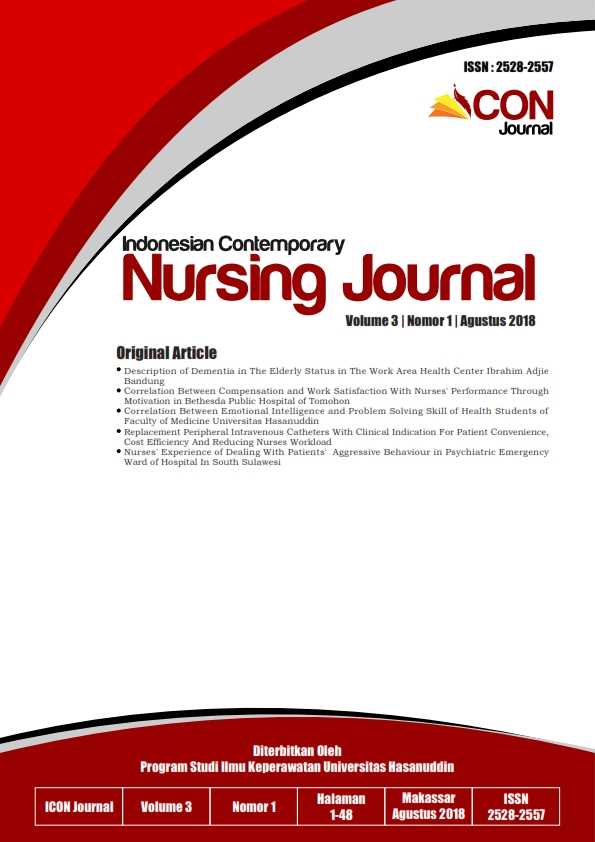Correlation Between Emotional Intelligence and Problem Solving Skill of Health Students of Faculty of Medicine Universitas Hasanuddin
DOI:
https://doi.org/10.20956/icon.v3i1.3602Abstract
Background: High demands in all conditions require proffesional health workers. In dealing with patients, health workers need high emotional intelligence and problem solving skills that are qualified to deal with various problems. Objective: To analyze correlation between emotional intelligence with problem solving skill of health student of Faculty of Medicine Universitas Hasanuddin. Method: This quantitative research was conducted in August-September 2017, using observational study design with cross sectional analytic approach. Population in this research is health students Faculty of Medicine Universitas Hasanuddin who forced in 2013, 2014, 2015, 2016 (N=1995). Sampling technique using cluster random sampling (n=333). The data were analyzed with Spearman’s Rho test. Results: More than half of respondents had a low emotional intelligence (58.3%) and medium level of problem solving skill (51,4%). Correlation coefficient both of them is weak (r=0,222; p value = 0.000 <0,05). Conclusion: There is a weak correlation between emotional intelligence with problem solving skill of health student of Faculty of Medicine Hasanuddin University. The higher the emotional intelligence of the student, the higher the level of problem solving skill.
References
Agustian, A. G. (2005). Rahasia sukses membangun kecerdasan emosional dan spiritual. Jakarta: Arga Tilanta.
Beauvais, A. M., Brady, N., O'Shea, E. R., & Griffin, M. T. (2011). Emotional intelligence and nursing performance among nursing students. Nurse Education Today, 396–401.
Chun, K. H., & Park, E. (2016). Diversity of emotional intelligence among nursing and medical students. Osong Public Health Res Perspect , 261-265.
Freshwater, D., & Stickley, T. (2009). The heart of the art : emotional intelligence in nursing education. San Fransisco: Jossey-bass.
Goleman, D. (2015). Emotional Intelligence. Jakarta: PT Gramedia Pustaka Utama.
Lindebaum, D. (2013). Does emotional intelligence moderate the relationship between mental health and job performance? An exploratory study. European Management Journa , 1-6.
Marks, A., Horrocks, K., & Schutte, N. (2016). Emotional intelligence mediates the relationship between insecure attachment and subjective health outcomes. Personality and Individual Differences , 188–192.
Mayer, J., Salovey, P., Caruso, D., & Sitarenios, G. (2006). Emotional intelligence as a standard intelligence. Washington DC: Delmar Publishers.
Othman, C. N., Yusof, M. S., Md Din, A., & Zakaria, L. A. (2016). emotional intelligence and personality traits in relation to psychological health among pharmacy students in malaysia. Social and Behavioral Sciences , 253 – 262.
Palanci, M., & Okutan, M. (2013). Explanation of school administrators’ problem solving skills with their personality traits, emotional intelligence and emphatic tendency. Procedia Social and Behavioral Sciences 9 , 1993–1997.
Shahba, S., & Allahvirdiyani, K. (2013). Comparative study of problem-solving and emotional intelligence on decreasing of third grade girl students' aggression of the rajaee guidance school of tehran. Social and Behavioral Sciences , 778 – 780.
Smith, K. B., Profetto-McGrath, J., & Cummings, G. G. (2011). Emotional intelligence and nursing: An integrative literature review. International Journal of Nursing Studies, 1624–1636.
Sommaruga, M., Casu, G., Giaquinto, F., & Gremigni, P. (2016). Self-perceived provision of patient centered care by healthcare. Patient Education and Counseling , 1-6.
Downloads
Published
How to Cite
Issue
Section
License
Authors who publish with this journal agree to the following terms:Authors retain copyright and grant the journal right of first publication with the work simultaneously licensed under a Creative Commons Attribution License that allows others to share the work with an acknowledgement of the work's authorship and initial publication in this journal.
Authors are able to enter into separate, additional contractual arrangements for the non-exclusive distribution of the journal's published version of the work (e.g., post it to an institutional repository or publish it in a book), with an acknowledgement of its initial publication in this journal.
Authors are permitted and encouraged to post their work online (e.g., in institutional repositories or on their website) prior to and during the submission process, as it can lead to productive exchanges, as well as earlier and greater citation of published work (See The Effect of Open Access).
Accepted 2018-08-12
Published 2018-08-30



